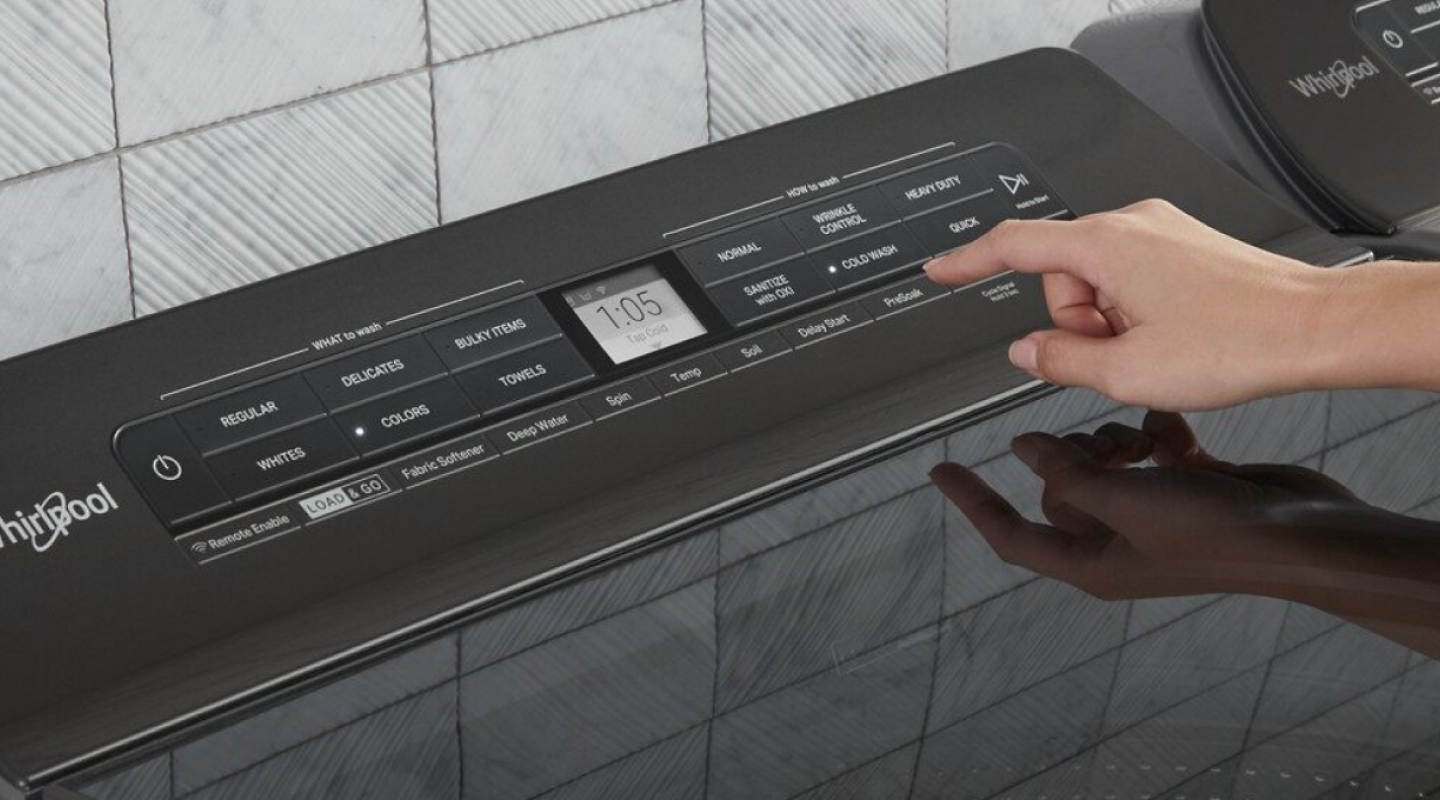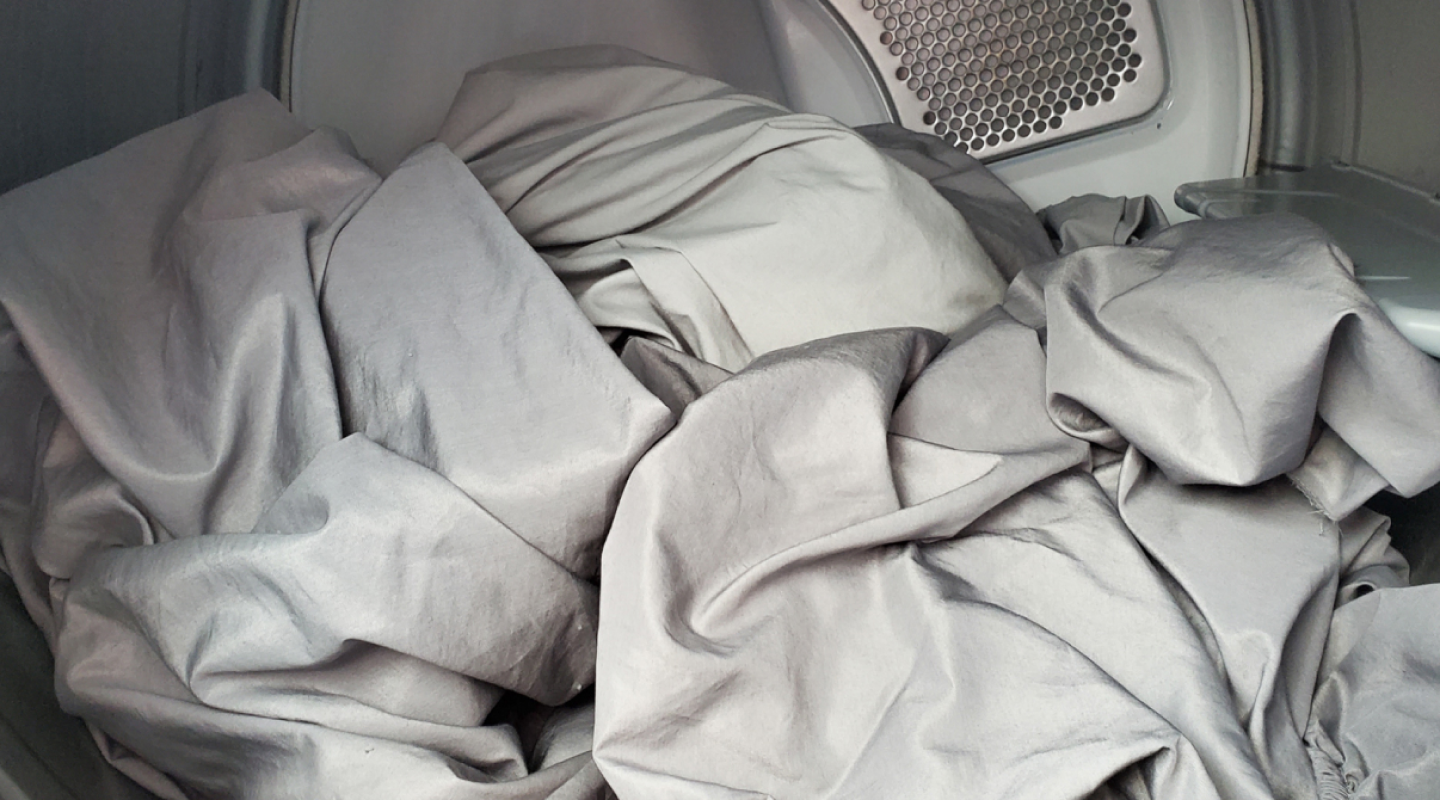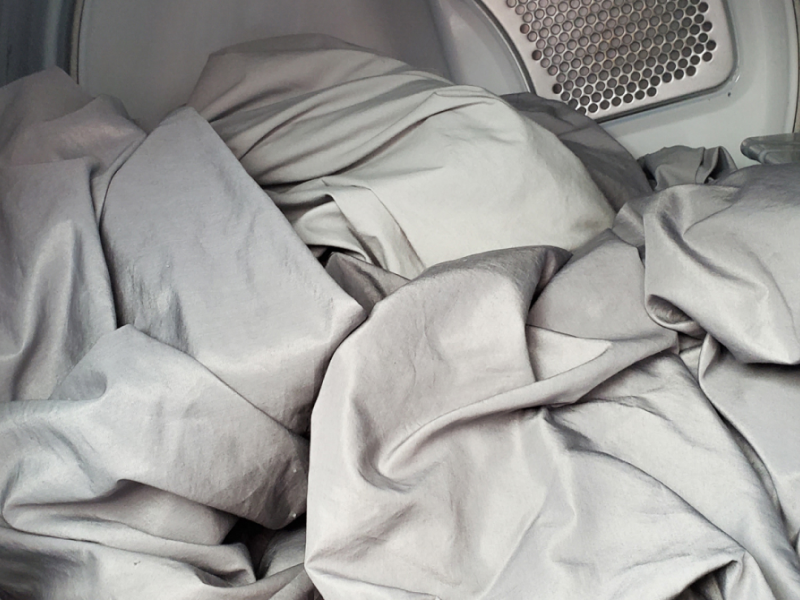
How to wash sheets
We all know that it’s important to get a good night’s rest, and fresh, clean bed sheets can help make your sleep more enjoyable. This step-by-step guide will show you how to wash bed sheets with the right settings for different fabrics.
How often should you wash your sheets?
Since germs, sweat, oils and more can build up fast, bed sheets should be washed at least once a week to keep them crisp and clean. If you or a family member tends to sweat while sleeping, or if a child wets the bed, you may want to wash sheets more often.
How to wash bed sheets: a step-by-step guide
Using the proper laundry cycle can help keep your bed sheets in the best condition. In general, the bulky/sheets washer cycle uses warm water, a low spin speed, more water and is designed to help keep sheets from tangling up. The ideal dryer setting is low to medium heat due to the fabric weight.
These washer and dryer settings may vary depending on the fabric. Some bed sheet fibers are more delicate than others and require gentle laundry care. Always check the care label for your sheets before washing and drying them.
Supplies
Detergent
Stain remover (optional)
Bleach (optional)
Dryer balls (optional)
Tools
Washing machine
Dryer, clothesline or indoor drying rack
Step 1: Consult the care label
As with any fabric, check the care label before washing bed sheets. Depending on the fabric type, you may need to use a specific wash or dry cycle.
Step 2: Treat any stains before washing
If there are any visible or stubborn stains, such as blood, use a pre-wash stain remover that’s safe for the fabric to treat the stains prior to washing. Select Whirlpool® top load washers include a Pretreat Station, which features a built-in faucet and pretreat brush so you can soak, scrub and wash all in one spot.
Step 3: Load sheets and add detergent
Sheets should be washed in a separate load from comforters, towels and other items. Washing sheets with towels can cause pilling and excess lint to form on the sheets. Be sure to evenly distribute the sheets in the washer to avoid bunching and tangling. In top load models, place sheets loosely around the impeller or agitator to balance the load. To ensure optimal cleaning, don’t try to wash too many sheets at once.
If your washer has a detergent dispenser—whether it's a bulk dispenser like the Load & Go™ Dispenser or a single dose dispenser—follow the manufacturer’s instructions and add detergent as you would for a normal load. For washers without a dispenser, add detergent according to the detergent manufacturer’s recommendation. You can also use Swash™ Laundry Detergent, which is designed with a pre-measured pour dosage cap.
Cleaning tip: Skip the fabric softener
Fabric softener, including dryer sheets, can affect the absorbency of natural fabrics, so it’s not recommended for bed sheets.


Step 4: Choose the right wash cycle and settings
Bed sheets should be washed in the warmest water appropriate for the fabric, using a sheets cycle or the cycle recommended in your washer’s use and care guide. If there isn’t a cycle specified, a normal or regular cycle will usually suffice for cotton, polyester or linen sheets. Certain fabrics like silk, satin or bamboo may require a more gentle or delicate cycle. Some washers, like Whirlpool® top load models with Intuitive Controls, help you choose a cycle based on what you’re washing and how you’re washing it.

How to wash cotton sheets
Water temperature: Warm or hot
Cycle: Sheets, Normal, Regular, Casual or Sanitize
Cotton bed sheets are sturdy enough to be washed in hot water using a cycle specifically for sheets or a normal or regular cycle. If someone in your household has been sick, you may want to opt for a sanitizing cycle. On Whirlpool® washers, this cycle eliminates 99.9% of the most common bacteria found in clothes, sheets and towels.

How to wash polyester blend sheets
Water temperature: Warm
Cycle: Sheets, Normal, Regular or Casual
Bed sheets that are made of a polyester blend should be washed in warm water using a sheets cycle or regular cycle.

How to wash silk and satin sheets
Water temperature: Cold
Cycle: Gentle or Delicate
Silk or satin bed sheets require special care, including using a mild detergent specially formulated for delicate fabrics. Use only cold water and a gentle or delicate cycle to avoid damage. Lower spin speeds also help keep delicate fabrics in good shape.

How to wash flannel sheets
Water temperature: Cold or warm
Cycle: Gentle or Delicate
The first time you wash flannel bed sheets, use a half a cup of distilled white vinegar instead of detergent to help prevent pilling and color bleeding. After that, it’s fine to use a gentle detergent. Always wash in cold or warm water using a gentle or delicate cycle to prevent wear and tear.

How to wash linen sheets
Water temperature: Cold or warm
Cycle: Sheets, Normal, Regular or Casual
For linen bed sheets, avoid hot water that could damage the fibers and consider using a natural detergent. Wash in cold or warm water using a cycle specifically for sheets or a normal cycle.

How to wash bamboo sheets
Water temperature: Cold
Cycle: Gentle or Delicate
Bamboo bed sheets should be washed much like silk or satin sheets to preserve the natural fibers. Use cold water and a gentle or delicate cycle to keep them in good shape.


Step 5: Dry sheets in the dryer or line dry
Most sheets can be tumbled dry on low heat. Avoid drying them for too long or at too high of a temperature, as this can cause fabric damage. You can add rubber or wool dryer balls to the load to help with even drying and to help stop sheets from balling up.
For more delicate fabrics, like silk or satin, or to add some freshness to sturdier fabrics, line dry the sheets on a clothesline. If line drying isn’t an option, you can use the dryer on a no-heat or air dry setting.
Step 6: Fold and store sheets properly
Fold and stack sheet sets neatly and store them in a cool, dry spot to keep them fresh and clean.
Cleaning tip: How to keep white sheets bright
White sheets can often appear dingy or yellowed over time due to body oils, sweat and other causes. You can brighten up white cotton sheets while doing a regular wash with detergent by adding about half a cup of bleach. Add the bleach either to the automatic bleach dispenser or to the load during the final rinse cycle (approximately the last 5 minutes of the wash cycle).
Shop Whirlpool® washers and dryers
Keeping your bed sheets in good condition is easy when you choose the right laundry cycle for your fabric. Whirlpool® washers and dryers with Intuitive Touch Controls offer a range of settings to fit your laundry load. Simply select “what” and “how” you want to wash or dry your laundry. Washers and dryers from Whirlpool brand can help provide optimal fabric care by letting you create custom cycles based on what you’re washing.
Explore more laundry cleaning how-tos


home heartbeat
Ready for more tips, home hacks and appliance guides?



